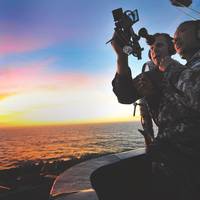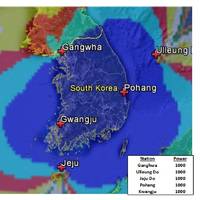ASGARD: Developing an Anti-Spoofing Weapon

Saab and GMV are collaborating in ASGARD, an EU-funded project that aims to improve maritime security when using GNSS and OSNMA. The project addresses the growing threat of GNSS spoofing and other cyberattacks on navigation systems used in the maritime industry.The ASGARD project, run by Saab and GMV, is an ambitious European Union (EU) initiative that aims to develop advanced technologies to improve Global Navigation Satellite System (GNSS) and Open Service Navigation Message Authentication (OSNMA) security in maritime environments.
Automated Skill Erosion

The increasing automation of vessels is causing some mariners to lose basic maritime skills. During dinner on June 10, 1995, the last night before the cruise ship Royal Majesty was due to arrive in Boston from its voyage to Bermuda, the master bragged to the passengers at his table that his ship could never run aground because it had all the latest electronic equipment, including a navigation system that integrated the GPS signals and other information. At 2225 that night the ship grounded on the Rose and Crown Shoal near Nantucket. It was 17 miles west of its planned trackline.
EU Pulls Plug on Back-Up Nav System
A British-led initiative to create a back-up to satellite navigation systems for ships has been pulled after failing to garner interest from other European countries, despite its proponents pointing to the growing risk of disasters at sea. Vessels increasingly rely on devices that employ satellite signals to find a location or keep exact time, including the Global Positioning System (GPS). Paper charts are used less frequently due to a loss of traditional skills among seafarers. Experts say GPS is vulnerable to signal loss from solar weather effects or radio and satellite interference or deliberate jamming, which South Korea experienced from North Korea in recent years.
Threats to Global Navigation Satellite Systems

Originally developed to guide Allied convoys safely across the Atlantic, the use of synchronized low frequency radio signals as a navigational aid revolutionized modern maritime navigation in the 1940s. Faced with operating ships and aircraft over vast areas, researchers pioneered the use of radio signals to aid navigation in regions where poor weather conditions made traditional methods—such as dead reckoning and celestial navigation—exceptionally difficult. This system was eventually named LORAN.
European GPS Slated for 2014 Launch
Galileo, the EU satellite navigation program (the European GPS) and Copernicus, the EU Earth monitoring program, are in decisive phases this year. With the launch of six additional Galileo satellites, Europeans will soon be able to enjoy their own satellite navigation system. The first Copernicus satellite launch in March will also enable considerable progress in improving maritime security, climate change monitoring and providing support in emergency and crisis situations. The progress in both European space programs - Galileo and Copernicus - was announced by Vice President Antonio Tajani following a meeting with Jean Jacques Dordain…
Russian GLONASS GPS Designer Fired
The chief designer or Russia’s Glonass satellite navigation system, Yury Urlichich, has been dismissed. The Glonass program has been in the works since the 1970s, but underwent a radical revamp in 2001. The 24 satellites comprising the system were put into orbit by 2010, The program cost 140 billion rubles (US$4.4 billion) to implement, and its budget for 2012-2020 stands at a further 326 billion rubles (US$10 billion). According to RiaNovosti the decision was made by the government’s military-industrial commission, which is headed by Russia's Deputy Prime Minister Dmitry Rogozin. Russia’s rival to GPS was rocked by fraud allegations earlier this month, with the Interior Ministry accusing unnamed Glonass officers of embezzling 6.5 billion rubles (US$200-million) of program’s funds.
China Begins Work on its SATNAV Test Network
China to build a test & certification network for its Beidou satellite navigation system over the next three years. An authoritative testing and certification system with uniform standards and legal support will secure the Beidou system's safe operation and accelerate its industrialization, said a statement from the government's Certification and Accreditation Administration. By 2015, a national testing center will be set up in Beijing, while another seven local sub-centers will be established across the nation, it said. The centers will test the safety and accuracy of products designed for use with the system and qualify them for civilian use. China began to construct the Beidou system in 2000 with a goal of breaking its dependence on GPS by 2020.
Russia Offers India GLONASS Deal
The Global Navigation Satellite System (GLONASS), which was officially launched in 1993, is a Russian counterpart to the U.S. Global Positioning System (GPS). It fixes the location and speed of surface, sea and air objects to within an accuracy of one meter. Russia and India have been cooperating on use of GLONASS for more than four years, but Russia has not previously offered equal joint participation in upgrading the system. Deputy Prime Minister Dmitry Rogozin, who has special responsilibity for Russia's military-industrial complex, said: "We have offered our Indian counterparts not only use of the Glonass system but also participation in upgrading it. We practically see it as a joint effort.
China's GPS 'Beidou' to be Enhanced
The Third China Satellite Navigation Conference in progress in Guangzhou, South China’s Guangdong Province, with satellite experts, government officials and business executives from China, the US, Russia, Europe and Japan participating in the event.The Beidou system chief designer, Sun Jiadong, said China will expand the Beidou satellite navigation service across the entire country. Beidou is a satellite navigation system developed by China and has been providing services since the end of 2011. The conference is a key stage for China to exchange knowledge with the world about satellite navigation know-how and to enhance innovation of its own satellite techniques.
European Global Navigation Satellite System
The UK Department for Transport summarized the Department’s work on the European Global Navigation Satellite System programs Galileo and EGNOS. Galileo is the European Union’s global navigation satellite system (GNSS) and will be fully interoperable with the US GPS system. The European Geostationary Navigation Overlay Service (EGNOS) is the first pan-European satellite navigation system. It augments GPS, making it more suitable for safety-critical applications, such as navigating ships through narrow channels. (9/16/10). (Source: Bryant’s Maritime News)
Feature: Losing Contact ... Not an Option
Maritime communications is an estimated $1 billion industry, encompassing ship operators, merchant fleets, governments and private yacht owners. There is arguably no more quickly evolving technical sector in the maritime market than the satellite communications niche. Safety, operational efficiency and quality of life onboard vessels of all type and size today more than ever depends on clear, reliable and cost effective satellite communication services and products. The following reports on recent advances from major service, product and system suppliers. The year started with news that Connexion by Boeing, a business unit of The Boeing Company, would roll-out its high speed satellite broadband capability for the maritime industry.
Navy, USCG Join Forces To Protect Homeland
As increasing attention is paid to ensuring the nation is secure from attacks - whether direct or covert - via the waterways, companies that supply vessels and equipment to the Coast Guard and Navy are quickly planning for an expected upturn in business. Last month Admiral Robert Natter, Commander in Chief of the U.S. Atlantic Fleet, and Vice Adm. Thad Allen, Commander of the Coast Guard Atlantic Area, announced the assignment of four Cyclone-Class Navy Patrol Coastal (PC) ships in support of the nation's homeland security Operation Noble Eagle. Two additional PCs will be assigned to the Pacific Coast. For the first time, U.S. Navy ships will be employed jointly with the U.S. Coast Guard to help protect the nation's coastline, ports and waterways from terrorist attack.
New Satellite System Could Find Sunken Ships
A new European Union-backed radio satellite system could help find sunken ships, EU officials said, promoting the potential benefits of the "Galileo" satellite navigation system. The EU hopes to have the system up and running by 2005 at a potential cost to taxpayers of around $2.9 billion, although the EU hopes private firms will contribute 50 percent. The EU this month secured the radio frequencies needed to launch the system at an international conference in Turkey. More detailed plans will be drawn up before the end of the year. Galileo, a European rival to military global positioning systems operated by the United States and Russia, will be able to locate objects or people to within 16.4 ft. (5 m).
Vessel Focus: Patrol Boats
Halter Marine has answered the call from the Venezuelan Navy for a variety of patrol boats. The company recently delivered four 80 ft. (24.3 m) boats to the country's government, which completes the contract for the design and construction of 12 total vessels in this size range. Designed for high speed operations in coastal and riverine environments, the vessels will be used for a variety of patrolling efforts in Venezuelan territorial waters, specifically to counter illegal drug traffic, provide search and rescue assistance, and disaster relief. Powered by a pair of Detroit Diesel marine engines, the vessels will have a range of 1,000 nm and a maximum speed of 25 knots. Halter also supplied the last two 54 ft. patrol boats for the Venezuelan National Guard.
Vessel Focus: Navy Boats
Halter Marine has answered the call from the Venezuelan Navy for a variety of patrol boats. The company recently delivered four 80 ft. (24.3 m) boats to the country's government, which completes the contract for the design and construction of 12 total vessels in this size range. Designed for high speed operations in coastal and riverine environments, the vessels will be used for a variety of patrolling efforts in Venezuelan territorial waters, specifically to counter illegal drug traffic, provide search and rescue assistance, and disaster relief. Powered by a pair of Detroit Diesel marine engines, the vessels will have a range of 1,000 nm and a maximum speed of 25 knots. Halter also supplied the last two 54 ft. (16.4 m) patrol boats for the Venezuelan National Guard.
NovAtel Awarded Galileo Contract
NovAtel has been granted a contract by the European Space Agency (ESA) for definition work on Galileo, the proposed European satellite navigation system. The $126,700 contract calls for NovAtel to provide input to ESA on signal validation and receiver development requirements. The company will also review draft Galileo signal specifications and provide feedback on receiver performance, development requirements and cost implications. Working directly with ESA technical management, NovAtel expects that the study will be complete during the next six to eight months. Jointly initiated by the European Union and ESA, the Galileo project aims to launch a series of Medium Earth Orbit satellites in three orbital planes at 20…
GALILEO: 2008 or Bust
The European Union is on track to start its own satellite navigation and positioning system, Galileo, as it was earlier this year announced that the Council of Transport Ministers released the $44 million needed to develop Galileo, and at the same time adopted the regulation establishing the joint undertaking responsible for operating it. Galileo is being developed as a commercial alternative to the U.S. GPS system, and tentatively is scheduled to be up and running by 2008. While markets are varied, and much of the advantages are touted in terms of savings tot the airlines, the maritime sector, including offshore oil and gas exploration, has been targeted as a major market for the project.
Galileo Must Proceed Financing Difficulties
The European Commission (EC) has stated that the Galileo satellite navigation system must go ahead on schedule despite financial contribution delays experienced by the European Space Agency (ESA). Galileo is being designed to compete with the U.S. Global Positioning System (GPS) in the satellite navigation market. Source: HK Law
Port of Aden Takes Delivery of New Tug
The Yemen Port Authority fleet at Aden have taken delivery of bollard pull Tug “Wadi Hassan” built by Damen Shipyard in The Netherlands. Each of the Azimuth Stern Drive (ASD) tugs has two propellers that can rotate through 360 degrees to give tremendous manoeuvring ability ahead, astern and sideways. This tug, and her sister vessel “Wadi Hateeb” due to complete trials in Holland next week, are an important addition to Aden’s towing capacity. The numbers of tankers, bulk carriers, container ships and other vessels calling at the port has more than doubled since 1995 and the total tonnage of ships calling has trebled over the same time. Towage capacity was becoming a limiting factor at the port.
Is It Back?
To say the Gulf of Mexico maritime business had a down year would be a major understatement. But rags-to-riches-to-rags experience of the past has resulted in a consolidated, resourceful group of companies poised to pounce on the next market upturn … which should be very soon. The business trends of consolidation and globalization that have largely defined the late 1990s have touched every level of business in the U.S., including the Gulf of Mexico maritime industry. Companies that had largely depended on "business as usual" are generally out of business today. The result: a resilient industrial base that is poised to prosper in good times and bad. "Business is bad right now, as the oilfield is our primary source of business," said Ralston P.
Bollinger Launches USS Tornado
Bollinger Shipyards, Lockport, La. has launched USS Tornado, the U.S. Navy's newest Patrol Coastal Ship. The 14th of the Cyclone Class constructed by Bollinger, under a sole-source contract with the Navy, the vessel is the first to include design modifications, equipment and armament upgrades as part of the Navy's Pre-Planned Product Improvement Program. Boasting a new, fully integrated bridge command and control system to increase the vessel's capabilities, Tornado is equipped with a satellite navigation system, forward looking infrared and surface radar with collision avoidance capabilities. The vessel is based on the Vosper Thornycroft Ramadan class design and modified to meet Navy requirements.
Up, Up and Away?
The only logical reason the sustained high price per barrel of oil has not already been dubbed "OIL BOOM 2000" is the fact that hindsight is 20/20. Companies that operate, build and supply vessels for the fickle oil patch have seen schizophrenic markets of days past bring industry goliaths to their knees. There remains a reserve among Gulf of Mexico area companies regarding prospects 2000 and beyond, but there is a growing feeling the business - which has largely been dismal since the end of 1997 - is set to embark on one of those notorious end runs that will fill area yards with healthy backlogs for years. The reason for the "look before you leap" attitude is also largely rooted in changing business dynamics which have effectively altered the way in which the world does business.












